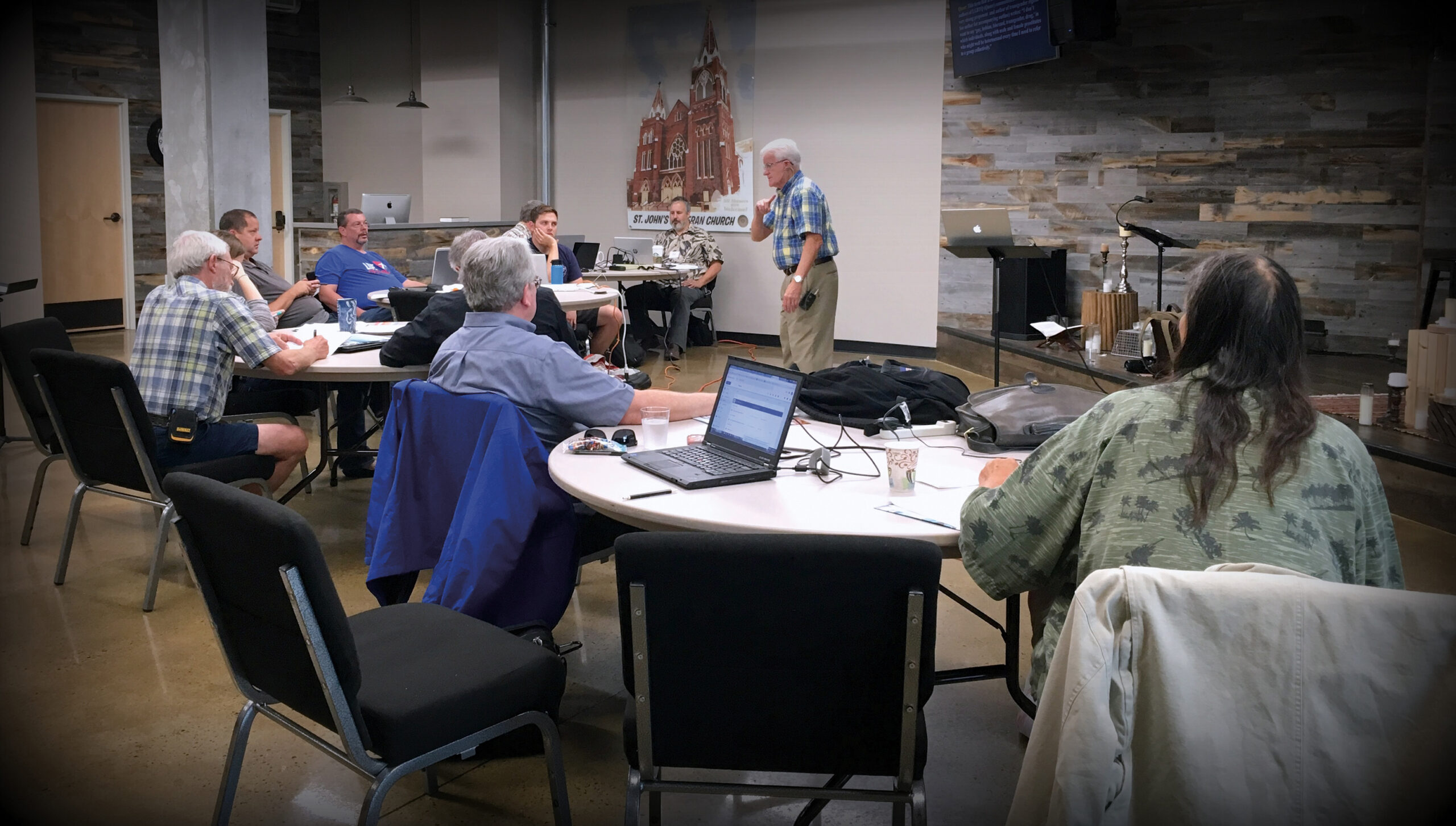
Concordia Seminary Newsroom
Summer Workshops: opportunities to hone theological edges

By Kim Plummer Krull

Professor Emeritus Dr. Robert Weise discusses “Transgenderism and the Christian Witness” at St. John’s Lutheran Church, Orange, Calif., one of 2017’s Summer Workshops offered by Concordia Seminary. Congregations across the country host the workshops led by Seminary professors for pastors, ministry leaders and laypeople to explore contemporary topics that influence the practice of ministry.
Photo: Courtesy St. John’s Lutheran Church
While Dr. Ralph Blomenberg appreciates that Concordia Seminary gave him an excellent theological education to begin his pastoral ministry, he also appreciates that he graduated in 1981.
As the changing world continually presents new ministry challenges, the Immanuel Lutheran Church, Seymour, Ind., pastor recognizes the need to continually “hone the edges” of his theological training. It is one reason he welcomes the opportunity for his congregation to serve as a host to Concordia Seminary’s annual Summer Workshops.
“Our Lutheran doctrine doesn’t change, but our applications in today’s world can change significantly,” said Blomenberg, whose church drew both pastors and laypeople for the “Theology for Pastoral Ministry in a Scientific Age” workshop presented last July by Dr. Joel Okamoto, the Seminary’s Waldemar and Mary Griesbach Professor of Systematic Theology and interim Chief Academic Officer.
During a time when the church is often viewed as anti-culture and anti-science, Okamoto discussed topics including God and creation, addressing “how we deal with discoveries of science while holding true to our theology,” Blomenberg said.
“Everyone is busy, but when we set aside time to hone the edges of our theological training, we’re better equipped to handle the changes and issues that are bound to arise,” said the pastor, whose congregation frequently hosts one of the many workshops offered across the country, June through August, led by Seminary faculty.
The workshops are typically held over a three-day period and explore contemporary topics that influence the practice of ministry, from the teachings of Martin Luther to pastoral tools, such as preaching, responding to conflict and teaching confirmation.
‘Seminaries in the community’
Last summer’s “Discipleship in the 21st Century” workshop at St. John’s Lutheran Church in West Bend, Wis., was “extremely well received,” said Rev. Jeff Dorth, St. John’s senior pastor. Church and lay leaders participated in the presentation by former Seminary Professor Dr. Anthony Cook on ways to better connect with people beyond the church family.
Since serving as a missionary-at-large in the Lutheran Church—Missouri Synod (LCMS) California-Nevada-Hawaii District in 1991, Dorth has considered congregations as “seminaries in the various communities where the Lord places them.”
“I saw then — and continue to see — how important the opportunities are for ongoing theological conversations that help people explore the Scriptures and God’s will for their lives,” Dorth said.
The Seminary is “blessed with great minds,” he adds, and he’s grateful that “men who serve as theologians on a full-time basis are available and willing to bring their training and ongoing research to the parishes, our seminaries in the community.”
World-class faculty, timely topics
“We don’t have to travel to them; they travel to us!” Blomenberg said of the Seminary professors who serve as leaders of the Summer Workshops. In addition to discourse with members of “a world-class faculty,” he cites an unexpected benefit: the relationships that develop.
“We may see each other only once a year at the workshops, but we look forward to them,” Blomenberg said, noting the collegiality that develops among attendees who come from throughout Indiana as well as Ohio, Michigan and other states. Mutual learning is among the reasons St. John’s Lutheran Church in Orange, Calif., serves as a workshop host.
“We like hosting these workshops because mutual learning can take place between the Seminary and local congregations,” said Dr. Michael Hayes, whose congregation provided an opportunity to explore a timely topic, “Transgenderism and the Christian Witness,” in July 2017. Seminary Professor Emeritus Dr. Robert Weise discussed questions such as how Christians should respond and witness in the public square in light of what it means to be human according to the Bible and the Confessions.
“Pastors get to learn from our leading Seminary professors, and the Seminary professors get a broader sense of what ministry and mission is like in an ever-changing culture,” said Hayes. “Over the years our participants have grown together as colleagues and are refreshed by their time together.”
Raising awareness of ministry partners
Camp Okoboji’s Lori Gamble in Iowa was all smiles last summer when a workshop drew the most participants since the Iowa outdoor ministry first hosted the workshops nearly a decade ago. The topic, exploring a “restructured, expanded, holistic and intergenerational approach to confirmation,” drew people from four LCMS districts.
Along with partnering with the Seminary, Gamble
appreciates the opportunity to raise awareness of the
longtime Lutheran ministry, located near Milford on
29 beautiful acres.
“For some people, that was the first time they had ever set foot on our campus,” the camp’s program director said of attendees at the workshop led by Seminary Assistant Professor of Practical Theology Dr. Peter Nafzger. The topic: young people “dropping out” of the church and one congregation’s efforts to address that disturbing trend.
This summer will be the 10th year for Camp Okoboji to host a workshop. Gamble expects another good turnout to explore an important theological topic and, she hopes, the camp’s resort-like setting.
“It’s cool to be able to come here for a class and also get to enjoy the beauty, and maybe even some fishing,” Gamble said.